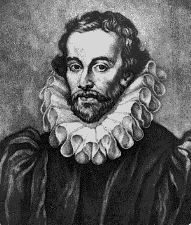|
Sir Edward Coke English lawyer and parliamentarian 1552 - 1634
He was born at Mileham in Norfolk on February 1, 1552, educated at Norwich grammer school and Trinity college, Cambridge, and entered the Inner Temple in 1572. Called to the bar in 1578, he soon acquired a reputation, his early cases including the Cromwell libel case and Shelley's Case. Under the patronage of Lord Burghley, Elizabeth I's first minister, he entered the public service and rose rapidly, becoming member of parliament for Aldeburgh in 1589 and solicitor general and recorder of London in 1592. A year later he was elected speaker of the house of commons, showing considerable skill in carrying out Queen Elizabeth's policy of curbing the commons' passion for discussing ecclesiastical matters. In 1593 he first crossed the path of Sir Francis Bacon. The attorney generalship fell vacant, and Bacon, supported by the earl of Essex, became Coke's rival for the post. Coke got it in 1594 and then kept Bacon out of the office of solicitor general as well, or so Bacon thought. Coke's first wife, Bridget Paston, died in 1598 and four months later Bacon was again his unsuccessful rival when he married Lady Elizabeth Hatton; it was a tempestuous and unhappy union. As attorney general Coke was the champion of the crown and its prerogative powers. He started a series of state prosecutions for libel and conducted the great treason trials of the day, prosecuting the earls of Essex and Southampton in 1601, Sir Walter Raleigh in 1603 and the Gunpowder plot conspirators in 1605. His methods in these trials, especially in that of Raleigh, were brutal even by the standards of his age. In 1606 Coke was made chief justice of the common pleas, and there then began the series of conflicts which eventually broke his judicial career. At the time of Coke's appointment Archbishop Richard Bancroft had already started his attempt to shake off the control which the common-law courts exercised over the ecclesiastical courts by writ of prohibition. This matter came to a head when Coke, summoned to a disputation on the king's power to withdraw a case from the courts, earned James I's fury by his assertions that the common law was the supreme law and that "the king in his own person cannot adjudge any case..." In 1610 Coke again crossed the king when he gave his celebrated opinion on proclamations before the council, stating that the king cannot change any part of the common law nor create any offense by proclamation which was not an offense before. The same year he disputed the claim of the court of high commission to imprison for adultery and when, in 1611, James attempted to put him on the commission he refused. Coke's position was strong. Incorruptible and respected, he was the embodiment of the common law. A last attempt was made to "buy" him when in August 1613 James, on Bacon's advice, appointed him chief justice of the king's bench where it was hoped he would look after the royal interest. He was also made a privy councilor and was the first to be called lord justice of England. At the king's bench he retained his predominance and continued to maintain the supremacy of the common law over all persons and institutions except parliament. In June 1616 the privy council, with Bacon behind it, formulated three charges against him. One was purely trumped up and never proved, about a bond that had passed through his hands. The other two were charges of interference with the court of chancery and of disrespect to the king in the matter of commendams. Coke was forbidden to go on circuit, ordered to revise the "errors" in his Reports and on November 14, 1616, he was dismissed. Thereafter, in search of an influential friend, he offered his daughter in marriage to Sir John Villiers, brother of the duke of Buckingham. His wife, supported by Bacon, objected and hid the child, who was then only 14. Coke abducted her violently and had her married, strongly against her will, to Villiers. Coke made a gradual return to public life, and by 1617 was back in the privy council and in the Star Chamber. In 1620 Coke entered parliament again as member for a Cornish borough, in theory as a supporter of the king. Yet for the rest of his career he was a leading member of the popular party. He opposed Prince Charles's proposed Spanish marriage, took a part in drawing up the charges against Bacon and spoke in the great debate on the liberties of parliament (1621), spending nine months in prison as a result, but nothing was found that could incriminate him. In 1628 it was his bill of liberties that ultimately took the form of the Petition of Right. This was his greatest parliamentary hour. Admitting his changed views, Coke, at the age of 76, molded the ancient precedents, including Magna Carta, into a charter of liberty limiting the royal prerogatvie. He retired at the end of the session and died at Stoke Poges, Buckinghamshire, on September 3, 1634. His papers were instantly seized and some, including his will, were never recovered. |
All rights reserved. For details and contact information: See License Agreement, Copyright Notice. |
 Sir Edward Coke was an English lawyer whose defense of the supremacy of the common law against the claims of the royal prerogative had a profound influence on the development of English law and the
Sir Edward Coke was an English lawyer whose defense of the supremacy of the common law against the claims of the royal prerogative had a profound influence on the development of English law and the